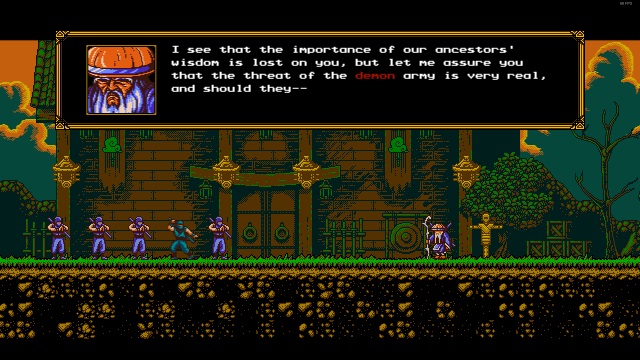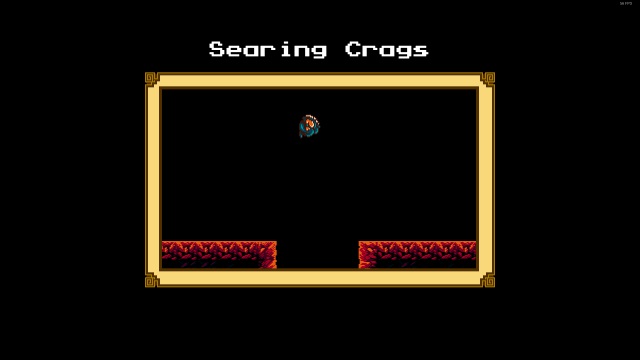There’s a particular emotion you feel when you’re reminded of a fond memory. There’s the initial feeling of warmth, followed by the excitement of getting to relive something you may not have thought of for such a long time. When it comes to video games and nostalgia, sometimes its a hit or miss game that leaves many people wanting more than what they initially thought they were getting prior to their purchase.
Hands down, The Messenger, does not disappoint and while it leans on several elements from the 80s and 90s era of platforming games, it brings plenty of new things to the table to make it stand out from others and drips with tongue-in-cheek humor from start to finish.
The Set Up
The story takes place in a world where the entire human race is nearly extinct, save for a gathering of survivors in a small village. Civilization was attacked by a demon army intent on killing and enslaving them all, but they were driven away by the survivors. Legends say the demon army threatens to return — but they have a hope. A hero from the west will appear with a scroll that, when the destined Messenger takes it to the top of the mountain on the island to give to three elders, everyone will be saved. As they await this hero from the west, the village trains for the day the demon army returns.

Our main protagonist finds himself wanting to skip these important lessons, feeling the dread of the day-in, day-out routine. On this fateful day, the demons return! And, just in the nick of time, the hero of the west arrives to give our hero his scroll, making him The Messenger from the legend. Now it’s up to him to travel across the island, face the demon army, and give the scroll to the three elders at the top to bring peace to the world once more!
The story certainly feels cliche, but the humor that takes place in the dialogue between all of the characters you meet on your journey makes up for it immensely.
Good Ol’ Nostalgia
Before you’re even in the game you can tell the developers spent a lot of time in their local arcades. They clearly missed the days they were asking their parents for their allowance in quarters so they could play their favorite pixel platformer — but they absolutely nailed it.

You play a light tutorial before you’re thrown into the fray of the game, and everything feels perfectly aligned. Our main character’s jumping arc lands in an ideal way, making dodging, attacking, air-jumping, and strategically timed dives over spikes feel phenomenal. The platforming doesn’t attempt to force you into too many creative moments until later on as the game gradually guides you throughout your time with it. The real challenges arrive after you’ve had some practice with the game, they don’t happen early on to make the entire experience feel tougher than it actually is.
The combat was designed to feel straight forward. Your character’s main weapon is a sword and the enemies usually die after one hit. There are a few stronger enemies, but most of them are strategically placed to feel like another game mechanic you need to avoid while traversing the game, weaving themselves in and out of the platforming challenges.
The same can be said about the bosses. One of the bosses took me about five tries, which was the most I died. The patterns become obvious pretty quickly, and you use skills you picked up during your time with the level to show how well you’ve mastered your time in the stage. Each boss comes with its own unique twist, making every fight stand out and feel like a fun experience. I never felt like I went against someone I had already faced.
The Pixel-Popping Art
The gameplay wasn’t what made The Messenger feel like a 90s arcade game brought to PC, though — it was the art. The wonderful, breath-taking art stood out during each stage, and every new stage in the game felt like an individual experience, something I would have loved to explore more of if it were an open-world game.

The island wasn’t a single, massive jungle with different colored trees every time I went to a new area. There’s a lava-filled mountain level, a snow level, a marsh level where the monsters themselves look different and reflect the environment they’re stationed in. Unfortunately, a few enemies you see in the beginning pop up in the later stages. But they’re not the only ones. Whenever you enter a new stage you can guarantee you’ll find something new attempting to kill you and disrupt your journey to the top of the mountain.
On the topic of enemies, the amount of diversity really made the game feel alive. As your character grows in skill and you become more familiar with the game, the developers continue to throw new, creative horrors for you to face that challenge you in a new way. They were uniquely placed on a stage to make you think of a brand new way to get past them and proceed forward. The further you get in the game, the fewer punches they hold back and the foes look just as beautiful and retro as the landscape you’re traveling through.
The On-Point Music
The music. I cannot, nor will I ever, get over the amazing music in The Messenger. This, along with the pixel art, made this game feel like the gorgeous throwback it desperately wants to be. The developers wanted to throw this game into an arcade machine and give it back to the 90s for their younger selves to enjoy.
During each stage, you’ll subtly notice the background music changing ever so slightly to sway with the environment. There’s no big differences or heavy things thrown in your face. Instead, you’re gifted to this wonderful ambiance as you slice your way through the demon army to save the world. You couldn’t ask for a better soundtrack.
Clever Dialogue and Writing
When I first fired up The Messenger, I assured myself I was in for a game where the developers were going to have tried too hard with being a note for note 90s game. I was dead wrong, and I’m happy about it.
The first indication of this change was when I arrived at the shopkeeper. I traveled into a mystical, starry realm surrounded by beautiful magic that I knew was beyond my character’s comprehension. The shopkeeper knew this too and assured him that whatever he saw here, he had to go with it or never feel comfortable there again. I immediately liked the robed shopkeeper and wished he would accompany me on my journey.

He kind of did, as he was the helpful game mechanic to give me new tools to use as I progressed through the stages. These useful tools were designed to change up how I played the game and provided another level of depth for my platforming skills, which were steadily growing throughout my playthrough.
Though they weren’t perfect, death was a welcome treat. Each time I died a small red, flying demon appeared to turn back time and return me to the nearest checkpoint I passed. His name was Quarble, and he’s the death mechanic in The Messenger. The consequence of having him with you was to consume any of the currency you collected along the way for a short amount of time.
Having Quarble as a brief companion and as a game mechanic was great as it crafted a new, fun way to make death a thing in the game, without making it a daunting task. They could have easily had it where you were thrown straight back to the start of the stage, but they were kind to have a series of helpful, well-placed checkpoints throughout the stages. Plus, each time you died Quarble would provide a small, sassy quote about your death. These quotes do repeat after a time, but it does take awhile. Don’t worry, I tried.
Putting It All Together
The developers wanted a game to throwback to the time when side-scrolling platformers had a specific art to them, back when they had style. They succeed in this along with great gameplay, an amazing soundtrack, wonderful art, and joyous writing I was looking forward to reading each time I died or stopped in to ask the shopkeeper about a new story they had.
While a little short, The Messenger was a fun time I’d happily play again in a heartbeat.







Published: Sep 4, 2018 04:15 am